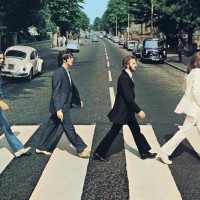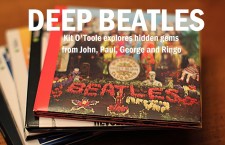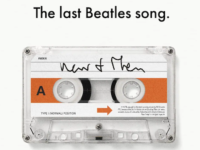Continuing the melancholic mood set by “Golden Slumbers,” “Carry That Weight” further stresses the turmoil the Beatles were experiencing by 1969. A brief reprise of “You Never Give Me Your Money” underscores this tension.
In a typical instance of understatement, John Lennon commented on the track in 1980: “That’s Paul. Apparently he was under strain at that period.” More accurately, all four members were struggling with money and contract issues, family commitments, and their growing artistic independence. Indeed, they were carrying several weights, and this section of the Abbey Road medley packs a corresponding emotional punch.
Paul McCartney composed “Carry That Weight” in reaction to the band’s various troubles. In Many Years from Now, McCartney told author Barry Miles that “at certain times, things get to me so much that I just can’t be upbeat any more and that was one of the times. We were taking so much acid and doing so much drugs and all this [attorney Allen] Klein shit was going on and getting crazier and crazier and crazier. Carry that weight a long time: like forever! That’s what I meant.”
McCartney, George Harrison, and Ringo Starr entered Abbey Road Studios on July 2, 1969 to record “Carry That Weight” and “Golden Slumbers” together. Lennon was still recovering from a car accident in Scotland, but would rejoin them about a month later. They recorded 15 takes of both tracks with Harrison on bass, Starr on drums, and McCartney on piano and lead vocal.
Takes 13 and 15 were deemed best, and George Martin, Geoff Emerick, and Phil McDonald edited both versions together. July 3 and 4 saw McCartney overdubbing lead vocals and rhythm guitar, while Harrison laid down his lead guitar part. All three then sang the “Boy, you’re gonna carry that weight; carry that weight a long time” lines; Lennon returned to the studio July 30 to add his vocals. Lennon continued this work the next day, while Starr overdubbed more percussion.
The group completed work on August 15, when the orchestral section was recorded (12 violins, four violas, four cellos, string bass, four horns, three trumpets, trombone, and bass trombone, according to the Beatles Bible). In general, the final version of “Carry That Weight” contains two unusual elements: first, the chorus features all four Beatles’ voices. Second, the “You Never Give Me Your Money” reprise did not contain multi-member harmonies, but McCartney’s voice multi-tracked.
As McCartney croons the word “lullaby,” Starr’s drums crash through to signal the next section of the medley. Strings give way to the foursome chanting the line “carry that weight” lyric, with Starr’s voice particularly distinctive here. The horns and Harrison’s guitar recall the melody from “You Never Give Me Your Money,” and McCartney’s multi-layered vocals reprise that song:
I never give you my pillow,
I only send you my invitations.
And in the middle of the celebrations
I break down.
The “breakdown” has a short life, however, as the Beatles resume chanting — almost shouting — the lines “Boy, you’re gonna carry that weight; carry that weight a long time.” Harrison’s guitar returns, sounding distorted, almost underwater, as he slightly recalls the “Money” melody.
Read in tandem, the lyrics resemble a dialog, either literally between two people or an inner debate. The narrator in “Money” still despairs over breakdowns in communication; here he appears alone despite being in a room filled with people. Contrast that stanza with the “carry that weight” segment, where “I” becomes “you.” A Greek chorus of sorts sympathizes with the previous speaker, telling him he will have to carry the burden of his depression. In other words, it may take a while before the sun reappears (to paraphrase another Abbey Road track) Anyone wanting to know the state of the Beatles at that time need only listen to this song — the pain and disintegration are dramatized musically and verbally.
“Carry That Weight” leads to the final lap of the Abbey Road medley. Will there be a resolution to this tension and anguish? Stay tuned for the next song.
- The Rescued Early Paul McCartney Song That Completed ‘Beatles For Sale’ - December 4, 2024
- A Rare Beatles Cover Proves John Lennon Was Wrong About His Voice - November 26, 2024
- How John Lennon Came Roaring Back on the Beatles’ White Album - November 22, 2023





Hi. Thanks for your good work on this Abbey Road series. Unlike a book, those youtube vids (unfortunately some no longer work) amazingly illumine your points.
So, one thing, as you’re preparing for The End, can you help flesh out the decision-making that swapped the sides of the LP (John wanting to end the Beatles with his harsh slash, and Paul getting his end instead)? I wonder if it was George Martin recommendation? Or was John won over by Paul’s brilliant lyric, which, I believe, arrived late?
Thanks for considering, Ms O’Toole.
Hi Lawrence:
Thanks for your comments! Yes, unfortunately the YouTube clips disappear quickly, but will probably reemerge soon under different accounts. So keep searching–chances are you’ll find them again!
Those are very good questions you raise, and I will certainly investigate them as I head into the final lap of the Abbey Road series. Thanks again for your kind remarks!